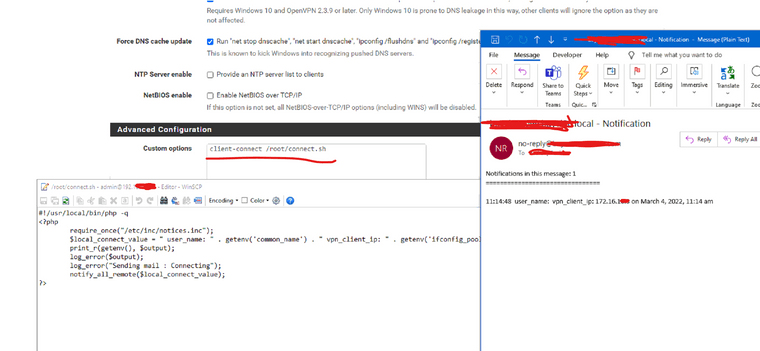Email Notification - OpenVPN Client Connect (Common Name)
-
Sorry, I didn't see a message that someone had posted in here.
Regarding the log file limiting you mention, I can't seem to find this in your code ?
I think it would be good to set a maximum filesize (and/or even truncate files) ? What would be best practice in implementing this ?Very good question and one I don't have an answer to. I haven't really looked at it other than to know it needs to be done, otherwise the file will just continue to grow. At that point, it may be a cron job but I'd assume it would be need to be handled like the rest of the system logs and I have no idea how to do that.
I can tell you that the site I developed this on has several VPN users that connect and disconnect frequently throughout the day. Their /var/log/OpenVPN_Users.log file appears to be growing at about 10K / week or roughly 1 MB every other year. Over the expected 7 year lifecycle I suppose it will only be about 3.5MB - 4MB in size. Hardly a concern for this system but for systems with many users constantly going in and out it could get larger, faster.
And what if one has multiple OpenVPN servers, would grouping by server be possible ? Maybe in the same manner as usernames are being propped in an array and end user can choose from by dropdown list ?
Another good question. I'm not sure if that is a variable that can be extracted. Since the script files are unique to the server you could theoretically just rename the connect.sh, disconnect.sh, OpenVPN_Users.log, and vpn_openvpn_userlogging.php files and then update the pointers in the files to the new locations. That would cause you to have a second page that tracks the second server. Off the top of my head it seems fairly simple for you to do manually, but not automatically by the script if you can't pull the name of the server from the $local_connect_value.
-
I had an issue with a user where the case changed between login and logout. No idea why but it created some oddities in the logs so I've updated the connect.sh and disconnect.sh files with a minor strtolower change.
connect.sh
#!/usr/local/bin/php -q <?php // Gather Info $date = date('Y-m-d'); $time = date('g:i a'); require_once("/etc/inc/notices.inc"); // Compile Info String to Send $local_connect_value = "USER: " . strtolower(getenv('common_name')) . "; CONNECTED; " . $date . "; at " .$time . "; IP CONNECTED FROM: " . getenv('trusted_ip') . " INTERNAL IP ASSIGNED: " . getenv('ifconfig_pool_remote_ip') . "\n"; // Send Email Notification of Event // notify_all_remote($local_connect_value); $filename="/var/log/OpenVPN_Users.log"; $fp = fopen($filename, 'a'); fwrite($fp,$local_connect_value); fclose($fp); ?>disconnect.sh
#!/usr/local/bin/php -q <?php // Gather Info require_once("/etc/inc/notices.inc"); $date = date('Y-m-d'); $time = date('g:i a'); $durationSeconds = getenv('time_duration'); // Function to calculate time from seconds to human readable format function seconds2human($ss) { $s = $ss%60; $m = floor(($ss%3600)/60); $h = floor(($ss%86400)/3600); $d = floor(($ss%2592000)/86400); $M = floor($ss/2592000); return "$d days $h hours $m minutes $s seconds"; } // Compile Info String to Send $local_connect_value .= "USER: " . strtolower(getenv('common_name')) . "; DISCONNECTED; " . $date . "; at " . $time . "; DURATION: " . $durationSeconds . " seconds or " . seconds2human($durationSeconds) . " DATA UPLOADED (RECEIVED): ". round(((getenv('bytes_received'))/1048576),2) . " MB DATA DOWNLOADED (SENT): " . round(((getenv('bytes_sent'))/1048576),2) ." MB\n"; // Send Email Notification of Event // notify_all_remote($local_connect_value); // Output to Log File $filename="/var/log/OpenVPN_Users.log"; $fp = fopen($filename, 'a'); fwrite($fp,$local_connect_value); fclose($fp); ?> -
 J johnpoz referenced this topic on
J johnpoz referenced this topic on
-
 J johnpoz referenced this topic on
J johnpoz referenced this topic on
-
 G Gertjan referenced this topic on
G Gertjan referenced this topic on
-
 G Gertjan referenced this topic on
G Gertjan referenced this topic on
-
It's been working in our environment but there's no real integration into the GUI and I need to manually type in the page each time. Is there a way to integrate it or get it integrated? I know if I go mucking around in the interface it's just going to get overwritten with the next update.
Also, 4 months later and the log file is roughly 169K in size so it will grow to about .5MB after a year, depending on usage. That keeps it in line with my estimate of 3.5MB-4MB after the 7 year lifecycle.
-
Our OpenVPN is using Radius Server synced with Windows Active Directory Domain server for logon. Is there any way this email notification will work in such a scenario?
because currently we only get the following information, username field is blank

-
"user_name" ?
"vpn_client_ip" ?Show the script you are using.
See the example "connect.sh" file above.
The scripts file is called with a bunch of pre defined environment variable set.
Ask Google how to print all the environment variables when it starts. Normally, if known, a variable like "common_name" should contain the name. -
my connect.sh is exactly what you mentioned in the post above 1646309481558
i just changed the name from notify.sh to connect.sh and left disconnect.sh as is.
/root/connect.sh file:
#!/usr/local/bin/php -q <?php require_once("/etc/inc/notices.inc"); $local_connect_value = " user_name: " . getenv('common_name') . " vpn_client_ip: " . getenv('ifconfig_pool_remote_ip') . " on " . date('F j, Y, g:i a'); log_error("About to send a mail : Connecting"); notify_all_remote($local_connect_value); ?>/root/disconnect.sh file:
#!/usr/local/bin/php -q <?php require_once("/etc/inc/notices.inc"); $local_connect_value .= ", during : " . getenv('time_duration') . " seconds, received : " . getenv('bytes_received') . " bytes, send : " . getenv('bytes_sent') ." bytes. DISCONNRECTED."; log_error("About to send a mail : Disconnecting"); notify_all_remote($local_connect_value); ?> -
A aasimenator referenced this topic on
-
Looks ok.
What happens - I think - is that when LDAP is used, the common_name environment isn't set as it isn't known. So getenv('common_name') return 'nothing' or an empty string.I've never used LDAP, so I can't be sure.
edit : again : have all the env variables printed, and see what's in there.
-
@gertjan said in Email Notification - OpenVPN Client Connect (Common Name):
have all the env variables printed, and see what's in there.
How do you do that?
-
I created a small test file /root/test.php :
#!/usr/local/bin/php -q <?php print_r(getenv(), $output); echo $output; ?>Now (made it executable) :
./test.phpworks for me.
Array ( [SSH_CLIENT] => 192.168.1.2 59841 22 [LOGNAME] => root [MAIL] => /var/mail/root [PATH] => /sbin:/bin:/usr/sbin:/usr/bin:/usr/local/sbin:/usr/local/bin:/root/bin [PWD] => /root [TERM] => xterm [SSH_TTY] => /dev/pts/0 [USER] => root [HOME] => /root [SSH_CONNECTION] => 192.168.1.2 59841 192.168.1.1 22 [SHELL] => /bin/sh [BLOCKSIZE] => K [HOSTTYPE] => FreeBSD [VENDOR] => amd [OSTYPE] => FreeBSD [MACHTYPE] => x86_64 [SHLVL] => 1 [GROUP] => wheel [HOST] => pfsense.munetwork.net [REMOTEHOST] => 192.168.1.2 [CLICOLOR] => true [LSCOLORS] => exfxcxdxbxegedabagacad )This was just a test - my script file
Add $output to the $local_connect_value string, and have it mailed to you.
Or log it :#!/usr/local/bin/php -q <?php require_once("/etc/inc/notices.inc"); $local_connect_value = " user_name: " . getenv('common_name') . " vpn_client_ip: " . getenv('ifconfig_pool_remote_ip') . " on " . date('F j, Y, g:i a'); print_r(getenv(), $output); log_error($output); log_error("About to send a mail : Connecting"); notify_all_remote($local_connect_value); ?> -
@gertjan
after changing the connect.sh file to your updated example i am not getting any new information in the email.

And this is what i see in the status of the VPN connection

-
@aasimenator said in Email Notification - OpenVPN Client Connect (Common Name):
i am not getting any new information in the email.
Because the variable $output was send to the local log, the most important screens in pfSense are the logs.
At the same place you will also have this line : Status > System Logs > System > GeneralAbout to send a mail : ConnectingThat's what
log_error("About to send a mail : Connecting");is all about.
It logs an 'error' which is actually just an incontinent text message.to the logs.Same thing for the variables your looking for : check the logs.
The output string $output can be added to $local_connect_value string, why not.
-
@gertjan

No information in the logs near the Connecting message -
There it is :

Never the less : nothing.
Unbelievable but I had to Google it up.Change
print_r(getenv(), $output);to
$output = print_r(getenv(), true);I've tested it.
It shows a lot of info.
One of them is the :
-
@gertjan Thank you so much for that. It seems to have worked and I could get all the information needed to get the data out in an email.
The only difference when using LDAP / Radius server in the getenv was changing ('common_name') to ('username')
In hindsight, I think maybe having the following option enabled in the OpenVPN config might have done the trick.

I do have a follow-up question, is there any way we can format the email better? e.g. newlines instead of everything in 1 line, I already tried \n or \r\n and even /n but none of them seem to work.
-
@aasimenator said in Email Notification - OpenVPN Client Connect (Common Name):
is there any way we can format the email better?
The small script file, see above, used by OpenVPN on a 'connect' event is written using PHP.
You can also use bash / sh / python / lua / or any high level copiled C or whatever ......Use any language you like.
-
Anyone's scripts just stop working?
I noticed sometime after August these scripts stopped working on my pfsense box. Not sure what is going on.
-
@boggie1688
There is a boatload of info present - above, to debug.
Can you say more as :@boggie1688 said in Email Notification - OpenVPN Client Connect (Common Name):
scripts stopped
-
@gertjan said in Email Notification - OpenVPN Client Connect (Common Name):
@boggie1688
There is a boatload of info present - above, to debug.
Can you say more as :@boggie1688 said in Email Notification - OpenVPN Client Connect (Common Name):
scripts stopped
Not sure where to start.
I've been using the same script for year or two and suddenly I stopped getting emails when I connect or disconnect. I haven't changed the scripts so I'm not entirely sure what would cause the lack of emails.
Given I changed nothing, I wondering if anyone experienced the same.
-
I haven't used what's being described here for a long time, as I'm the only one using my VPN access, and I already know when I am connected when I'm connected ;)
But :
I've added the third, "client-connect" line to the VPN server custom config :

I've created a file called /root/vpn.sh :
#!/usr/local/bin/php -q <?php require_once("/etc/inc/notices.inc"); $local_connect_value = " user_name: " . getenv('common_name') . " vpn_client_ip: " . getenv('ifconfig_pool_remote_ip') . " from: " . getenv('trusted_ip') . " on " . date('F j, Y, g:i a'); if ( strrchr (__FILE__ , 'disconnect') ) { $local_connect_value .= ", duration : " . getenv('time_duration') . " seconds, received : " . getenv('bytes_received') . " bytes, send : " . getenv('bytes_sent') ." bytes. DISCONNECTED."; } notify_all_remote($local_connect_value); ?>and made it executable :
chmod +x /root/vpn.shNow, when I connect, I see in the system log :

and I received the mail ....
As you said, nothing changed ;)
That is ..... there is something 'bad' going on.
I've changed the VPN server settings, so I had a look at the VPN server (re) startup log.
( never change settings without looking at the logs afterswards - and if you don't
And there was a warning :
This means that my client-connect overrides another client-connect !! So pfSense is also using the "client-connect" VPN server config command.
Let's check the OpenVPN server config file : /var/etc/openvpn/config.ovpn :... client-connect /usr/local/sbin/openvpn.attributes.sh client-disconnect /usr/local/sbin/openvpn.attributes.sh ... client-connect /root/vpn.shthat's bad indeed.
I've removed my custom config lineclient-connect /root/vpn.shas something tells me its better that :
client-connect /usr/local/sbin/openvpn.attributes.shis used as pfSense 'needs' it to work, to do what it has to do.
So, for now, forget about using "client-connect" in the custom config to have it call your own script (to send a mail or whatever).
It will 'break' other functionality.When I look at /usr/local/sbin/openvpn.attributes.sh, I can see stuff is done with certs, and subsequent files like /usr/local/sbin/openvpn.connect_async.sh does session stuff, and also logs :

Sending a mail would mean we have to "patch" this (these) files.
-
Thanks for the detailed reply.
I very much appreciate it.
I've never checked the system logs, so I learned something new today.